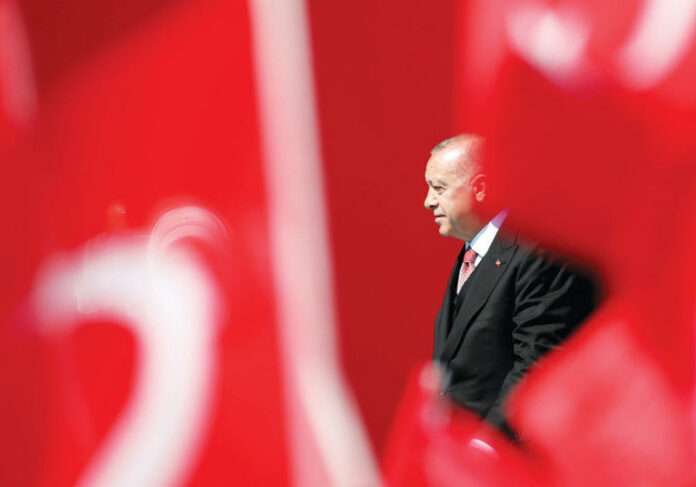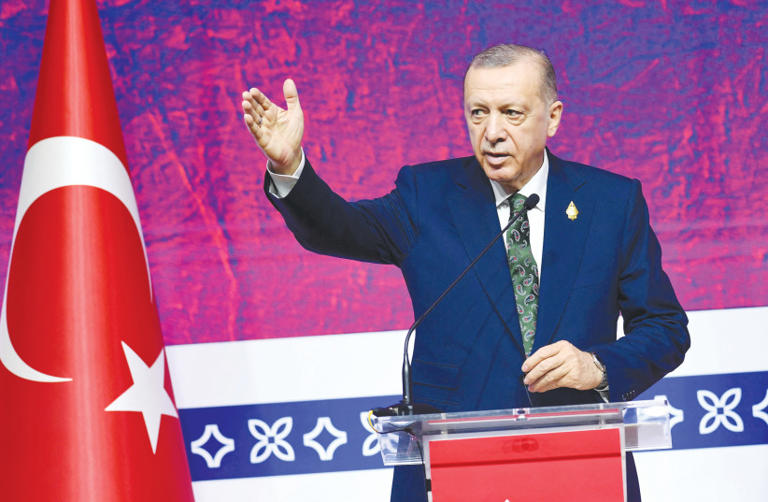Humiliation, the most potent human emotion, was whirling amid Istanbul’s mosques, bazaars, and seven fabled hills.
With 200 European warships anchored in its waters and 50,000 enemy troops camped on its shores, Istanbul experienced what it had not witnessed since Byzantium’s downfall: defeat.
The Ottoman Empire would live on life-support for another four years, but its demise was now as clear to its illiterate masses as it was to its dispirited elite. Conditions for revolution could hardly be more ideal, and in 1923 it indeed arrived, when General Mustafa Kemal replaced the monarchical past with a republican future.
Kemal’s Turkey would become secular in its laws, parliamentary in its politics, enlightened in its education, industrialized in its economy, and European in its diplomacy.
By the time the man known as Ataturk died in 1938, Turkey had separated religion and state and was in the process of turning a 90-percent illiterate population into a fully literate nation.
TURKEY’S PRESIDENT Recep Tayyip Erdogan speaks to journalists at the G20 summit in Bali, Indonesia, earlier this month. (credit: G20 Media Center/Reuters)
The humiliation that drove Ataturk was not his country’s military defeat. By the time he succeeded the sultans, his military defeated Greece, and Istanbul’s occupation had ended. Instead, what humiliated Ataturk was what he saw as his country’s backwardness, religiosity and royalist ossification, all of which condemned the Ottomans to diplomatic inferiority and national defeat.
That is why Ataturk opened thousands of schools, made education compulsory and equalized women’s rights. So radical was his westward pivot that he made Turkey shed the Arabic script it had used for centuries, replacing it with Latin characters, and also passed a law forcing all civil servants to wear European hats instead of the Ottoman fez.
Concerning Islam, Ataturk was so hostile to its centrality in Ottoman governance that he took religion out of the schools, outlawed religious activity in government agencies, closed down Sufi organizations throughout the country, and turned dervish centers into museums.
This, in brief, is how the humiliated Turks launched the revolution that lasted for 80 years, before it was challenged by a new humiliation that fed a new revolution – the Erdogan Counterrevolution, which has lasted 20 years and now begins to approach its end.
RECEP TAYIP ERDOGAN emerged at Turkey’s helm fueled by a sense of humiliation no less potent than Ataturk’s. However, unlike the former’s pain, which was national, his was religious.
“The mosques are our barracks,” he said in a 1997 speech as mayor of Istanbul, “the domes [are] our helmets, the minarets our bayonets, and the faithful our soldiers,” he went on, reciting an Islamist poem, and effectively challenging the Kemalists to a duel.
The secular establishment had no idea it was facing an approaching political reaction’s prophet and king. The agitating mayor was thus duly tried, convicted and jailed for violating the prohibition on religious incitement. Whether impressed by a combative politician’s plight, message, or charisma, millions were stirred. Erdogan’s speech may well be recalled as the counterrevolution’s battle cry.
It would take six years for the convict to reach power, and then several more for his imprint to mature. But the direction was stated early, when his “neo-Ottoman” diplomacy reverted Ankara’s binoculars from Kemal’s Europe to the Ottomans’ Middle East. It all seemed benign at the time, part of an effort to blend modernity and faith, Islamism with a human face.
At that early stage, Erdogan was also economically prudent, balancing industrial growth, budgetary frugality, and monetary discipline, thus stabilizing a previously inflationary currency, so much so that he reissued the lira, slashing six of its zeros.
It was against that sedating backdrop that Erdogan proceeded with his real agenda – the Kemalist legacy’s eradication – targeting first its most crucial, and vulnerable, component: the army. The generals – by Ataturk’s formula – were the guardians of the secular constitution. However, in many Western eyes they compromised democracy, and disciplining them was legitimate, even commendable.
Erdogan, therefore, increasingly confronted the generals, until in 2010 he arrested 20 of them, a provocation that made the entire high command resign, only to be summarily replaced with Erdogan’s loyalists. What was initially seen as a harmless neo-Ottoman renaissance, now emerged as what it really was: an Ottoman reaction.
THE REACTION would soon wage war on any engine of public power, whether actual or potential, real or imagined. What began with the military’s subjugation then spread to the judiciary, with thousands of judges and prosecutors fired, often replaced by legally inexperienced yes-men.
The attack then spread to the media, with scores of newspapers and broadcast stations either conquered or shuttered; and to academia, with thousands of professors and researchers losing their jobs, and sometimes their passports as well.
So obsessive was the new Sultanate with power that Erdogan – after housing himself in a $1.2 billion palace of more than 1,000 rooms – imposed himself even on the Bank of Turkey, forcing it to lower interest rates, and thus fan hyperinflation.
The result of this Ottoman absolutism was the same as its previous version’s: collapse.
Nepotism, cronyism, and bribery flourished; the economy tanked – the lira that was worth $0.75 when Erdogan reissued it now trades at hardly 5 cents – and millions know personally someone who was unjustly fired or jailed.
Erdogan’s original pretensions – to spread piety, embody morality, and inspire equality – are long dead. So is the vow to foster international harmony, which gave way to meddling in conflicts from Libya and Syria to Yemen and Iraq, while picking fights with multiple governments, from Cairo, Stockholm and Jerusalem to the Vatican and Berlin.
Last week, half of Turkey said it had enough of this reaction. Yes, the other half may well hand another five years to Erdogan the man, but Erdogan the gospel is now where the occupation of Istanbul left the Ottoman idea: between the people’s wrath and history’s dustbin.
www.MiddleIsrael.net
The writer, a Hartman Institute fellow, is the author of the bestselling Mitzad Ha’ivelet Ha’yehudi (The Jewish March of Folly, Yediot Sefarim, 2019), a revisionist history of the Jewish people’s political leadership.





